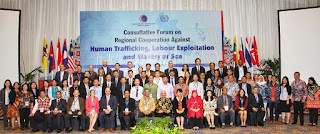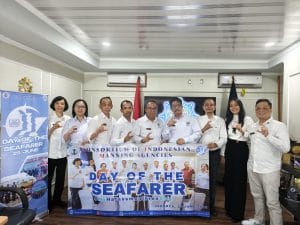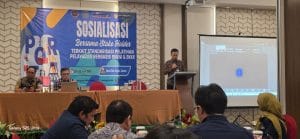Conclusions on regional cooperation against human trafficking, labour exploitation and slavery at sea in Southeast Asia
The Consultative Forum on Regional Cooperation against Human Trafficking, Labour Exploitation and Slavery at Sea, having met in Bali from 27 to 28 March 2018, adopts this Twenty-Eighth of March 2018 the following conclusions:
Introduction
1. Decent work and productive employment in the fishing sector are fundamental to ensuring
effective fishing operations, which themselves are critical to sustainable livelihoods and
food security. In Southeast Asia, the third largest contributor to global marine capture
fisheries production in 2013, fishing is also important to the economy of the region.
2. Decent work in the fishing sector is critical for achieving several Sustainable Development
Goals (SDGs), including SDG 2 on zero hunger; SDG 8 on decent work and inclusive economic
growth, in particular target 8.7; SDG 10 on reduced inequalities; and SDG 14 on life below
water.
3. Human trafficking for labour exploitation on board fishing vessels or other at-sea
operations has been identified as an issue of growing public concern in Southeast Asia.
Almost all countries in Southeast Asia have ratified the Protocol to Prevent, Suppress and
Punish Trafficking in Persons, Especially Women and Children, supplementing the United
Nations Convention against Transnational Organized Crime. The ASEAN Convention against
Trafficking in Persons (ACTIP) which came into forced in 2017 is a manifestation of the
region’s commitment to combat all forms of human trafficking.
Issues and challenges, and opportunities in combatting human trafficking, labour
exploitation and slavery at sea
4. Many of the region’s fishers are migrant fishers that work on vessels flagged to a country
other than their country of origin, and/or fish in waters far from home.
2
5. There is significant diversity in the practices and operations of the fishing industry in the countries of Southeast Asia, including large-scale commercial fishing operations and small-scale fisheries. While many have good practices, some fishing operators and recruitment agencies are engaged in abusive practices that fall into the category of human trafficking and forced labour, and even practices of slavery. Abuses are sometimes also found in fish farming, land-based fish processing, and other parts of the seafood supply chain, including against women and children.
6. Fishing is a hazardous occupation, with capture fisheries having among the highest incidence of occupational injuries and fatalities.1 Workers in commercial fishing operations face long working hours, dangerous weather conditions, and hazardous marine environments. Fishers on vessels live and work on board, often for extended periods in relatively confined spaces, and in isolation at sea far from help in terms of distance and time.
7. Migrant fishers are particularly vulnerable and can face challenges not experienced by other fishers. Two major areas of risks are: first, deceptive and fraudulent practices during the recruitment and placement process; and second, exploitative working conditions on board the fishing vessels. Either, or together, these vulnerabilities can result in migrant fishers falling victim to human trafficking, subjected to forced labour or even slavery. In some cases, restriction on the right to freedom of association in host countries may also increase their vulnerability to abuses.
8. While countries in Southeast Asia have made important efforts to regulate fishing operations, implementation and the imposition of sanctions are often challenging. Where inspections of fishing vessels are undertaken, they are often not coordinated nor combined to include inspections of working and living conditions of fishers and other relevant areas, which can create inefficiencies, disrupt fishing operations, and lead to loss of opportunities to combat human trafficking and labour exploitation.
9. At national level, there is often a lack of coordination among government agencies that are mandated to regulate areas that are directly or indirectly relevant to the protection of fishers including migrant fishers. The regulation of fishing licenses, vessel licenses, working conditions, labour migration, and efforts to combat human trafficking including interdiction of vessels are often dispersed among multiple agencies with distinct mandates. At national level, coordination between government agencies and an integrated approach to the protection of fishers, including migrant fishers, is necessary.
10. At national level, there is sometimes a lack of appropriate labour protections for fishers, or weak inspection and enforcement regimes. There are also sometimes a lack of complaints mechanisms or a system of investigation and response to such complaints.
11. At national level, there is also sometimes a lack of understanding on how port State and coastal State jurisdiction can be used to enforce labour laws. There is a need to strengthen the exercise of port State and coastal State jurisdiction for the enforcement of labour laws.
1 ILO. 2017. Tripartite Meeting on Issues Relating to Migrant Fishers. p 4.
3
12. The transnational nature of migrant fisher’s work in commercial fishing also poses challenges to effectively addressing abuses. Fishers can be recruited from their home countries, taken to a port of embarkation on a vessel often in a second country, and onto fishing vessels which may be owned by an entity based in a third country and flagged to a fourth country. In addition, the fisher may not be directly employed by the fishing vessel owner, but by a manning agency. The fishing vessel itself may pass through the waters of one or more other countries, and may land its catch or port at yet another country. While flag States have primary jurisdiction over a fishing vessel while it is at high seas, some flag States are unwilling or unable to enforce its jurisdiction and control.
13. There is an urgent need to identify and investigate problems and root causes of abuses of the rights of fishers. In particular, the challenges related to international recruitment and placement of migrant fishers need to be addressed. The role of informal labour brokers must be investigated and regulated.
14. There is a need for better data management and information sharing on the numbers of migrant fishers, their problems, and where abuses take place. However, the need for data and information should not be cause for delay in taking immediate and effective action to address abuses.
Recommendations for future action to improve cooperation to combat human trafficking, labour exploitation and slavery at sea
15. Governments, workers and employers in the fishing sector, should establish a multi-stakeholder regional coordination body in Southeast Asia to improve coordination in combating human trafficking, labour exploitation and slavery at sea. The regional coordination body should focus specifically on trafficking for labour exploitation on commercial fishing vessels, working and living conditions on fishing vessels, and slavery at sea.
16. The regional coordination body should promote and adopt an integrated, holistic, human rights-based and practical approach towards coordination on issues relevant to human trafficking and labour exploitation in fisheries, and slavery at sea.
17. The membership of the regional coordination body should comprise of the government, workers’ organizations, as well as employers’ organizations from Southeast Asia.
18. Other members, observers, and advisors of the regional coordination body should include States outside of Southeast Asia, such as market States, and other private sector stakeholders including private employment agencies, buyers, and multinational enterprises, and civil society actors, subject to invitation from the regional cooperation body.
19. The regional coordination body should also include advisors from international and regional organizations such as ASEAN, SEAFDEC, FAO, the Bali Process.
4
20. A technical working group for the development of regional coordination body is to be established, led by the ILO and appointed tripartite technical experts from each country. The technical working group should propose the Terms of Reference, Mandate and Structure of the regional coordination body.
21. Governments, workers, and employers in the fishing sector in Southeast Asia should consider the proposed Terms of Reference, Mandate, and Structure of the regional coordination body at the second Consultative Forum on Regional Cooperation to be held in 2018.
22. Priority areas of action for the regional coordination body should include:
a. Bilateral and/or multilateral agreements on labour migration are an important means of addressing issues concerning migrant fishers, provided that they are consistent with internationally recognized human rights instruments including fundamental principles and rights at work and other relevant international labour standards. Such bilateral and/or multilateral agreements should be effectively implemented and monitored.
b. Bilateral and/or multilateral agreements on the exercise of jurisdiction, particularly in relation to combatting human trafficking, labour exploitation, and slavery at sea need to be negotiated and concluded between countries of origin, port States, and flag States based on tripartite social dialogue. Such bilateral and/or multilateral agreements should be effectively implemented and monitored.
c. Procedures for fisheries operators and fishing vessels owners to obtain clearance for the use of migrant fishers are often difficult to navigate. Many fishers still pay recruitment fees, and complaint mechanisms for fishers are often insufficient. Better collaboration between labour sending States, labour receiving States, port States and flag States is needed, particularly with a view to addressing the use of brokers, subcontracting private recruitment agencies or manning agencies, and to facilitate safe, regular, and orderly migration.
d. There is a need to address the issues related to victims of trafficking and abandoned fishers. Better cooperation between States including through bilateral or multilateral agreements on repatriation and consular assistance can increase the effectiveness and timeliness of responses.
e. In order to effectively address the risks of human trafficking and labour exploitation on fishing vessels and during at-sea operations, there is a need to map and identify the gaps and challenges in the enforcement of labour protection. Strengthened exercise of the respective jurisdiction of flag States, port States, and labour-providing States is necessary. A clear division of roles and responsibilities between flag States, port States, and labour-providing States is crucial, and necessary for the coordinated exercise of respective jurisdiction.
f. Improved data and information sharing for agreed purposes and between counterpart agencies to improve effective responses to suspected cases of human trafficking and
5
labour exploitation, including in the rescue and repatriation of victims, the investigation and prosecution of crimes, as well as the imposing sanctions or the seeking of other remedies on fishing operators that violate laws.
g. Collaborations between workers’ and employers’ organizations across the region, and among themselves, can promote social dialogue in all its forms, and promote good industrial relations, sustainable economic development, decent work, and social protection in the fishing sector, including for migrant fishers.
h. Cooperation between workers’ and employers’ organizations have also led to private compliance initiatives in the region. Such promising practices, based on internationally recognized human rights including fundamental principles and rights at work, can be shared.
i. Promote the ratification and support the effective implementation of the Work in Fishing Convention, 2007 (No. 188), and other instruments relevant to the fishing sector through tripartite consultation
23. Workers’ and employers’ organizations in the fishing sector should:
a. Actively engage in efforts to establish a regional coordination body in Southeast Asia.
b. Actively promote and engage in effective social dialogue in all forms, including national, regional, international, and cross-border social dialogue where possible, in order to promote decent work in fishing and to ensure that fundamental principles and rights at work and relevant ratified international standards protect all fishers, including migrant fishers.
c. Actively promote policy coherence in public and private compliance initiatives and partnerships, and align them with relevant international labour standards and other relevant tools including international human rights instruments, the UN Guiding Principles on Business and Human Rights, the ILO Tripartite Declaration of Principles concerning Multinational Enterprises and Social Policy (MNE Declaration), and ASEAN instruments.
d. Ensure fishers and migrant fishers can access complaint mechanisms in cases of alleged abuse of their rights, irrespective of their legal status in a State, and that effective and appropriate remedies be provided where abuses have occurred.
24. Governments in Southeast Asia as flag States, port States, source States, and coastal or market States should:
a. Actively engage in, and allocate resources to, efforts to establish a regional coordination body in Southeast Asia.
6
b. Communicate the expectation that all stakeholders in the fishing sector within their jurisdiction respect fundamental principles and rights at work for all migrant fishers, including the right to organize and bargain collectively.
c. Promote the application of international labour standards and human rights instruments including the UN Guiding Principles on Business and Human Rights, the ILO Tripartite Declaration of Principles concerning Multinational Enterprises and Social Policy (MNE Declaration), and ASEAN instruments throughout the fishing sector and industry.
d. Strengthen coordination mechanisms between relevant national agencies including those with competencies in labour administration and inspection, licensing related to fisheries management and operations, migration/anti-human trafficking agencies, law enforcement agencies and others.
e. Strengthen labour administration and inspection systems to ensure compliance with laws and regulation; ensuring the inclusion of inspections for decent living and working conditions in vessel inspections where they take place; ensure that effective complaint mechanisms are accessible to migrant fishers.
f. Where ambiguity of the legal status of fishers and migrant fishers may exist due to legislative or governance gaps, ensure that legislation is amended for clarity.
g. Develop and implement bilateral, regional and multilateral agreements and arrangements relevant to fishers and migrant fishers, ensure the engagement of social partners and that those agreements are consistent with relevant international labour standards;
h. Harmonize migration policies consistent with international labour standards and human rights instruments.
i. Promote the ratification and effective implementation of the Work in Fishing Convention, 2007 (No. 188), and other instruments relevant to the fishing sector and industry through tripartite consultation and ensure coordination among agencies both at the national and international levels.
25. The ILO should:
a. Advise and act as the Secretariat to the regional coordination body to combat human trafficking and labour exploitation in fisheries in Southeast Asia.
b. Provide technical assistance, including capacity building and training, to governments and social partners in Southeast Asia to develop a regional action plan to combat human trafficking and labour exploitation in fishing.
7
c. Provide technical assistance, including capacity building and training, to governments and social partners on the development of national action plans to combat human trafficking and labour exploitation in fishing.
d. Provide technical assistance to governments to review their national laws and practices through gap analysis and other means, and assess if existing ILO programmes and instruments provide a sufficient framework for ILO constituents to promote decent work for fishers including migrant fishers and what additional guidance is needed;
e. Advise States engaged in bilateral, regional and multilateral agreements concerning migrant fishers, with a view to ensure that such agreements are based on social dialogue and are consistent with relevant ILO standards and fundamental principles and rights at work, and relevant human rights instruments;
f. Reinforce and expand partnerships with international organizations and inter-agency mechanisms working in the fishing sector and in combating human trafficking, such as, the Food and Agriculture Organization of the UN (FAO), International Maritime Organization (IMO), the International Organization for Migration (IOM), the International Criminal Police Organization (INTERPOL), UNODC and UN Oceans; regional organizations such as Association of Southeast Asian Nations (ASEAN), Southeast Asian Fisheries Development Center (SEAFDEC), the Bali Process on People Smuggling, Trafficking in Persons and Related Transnational Crime (Bali Process), and Coordinated Mekong Ministerial Initiative against Trafficking (COMMIT); and all other partners, to foster policy coherence in order to ensure decent work for migrant fishers, with ILO leading on labour related issues.






